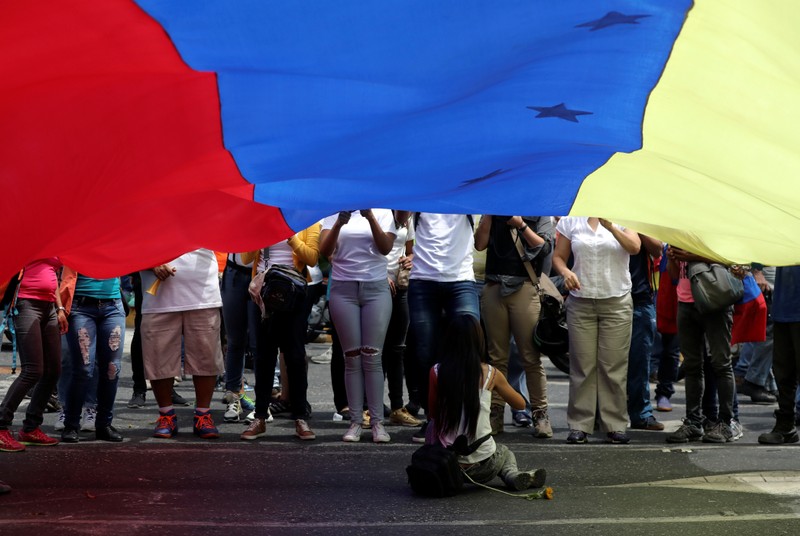
Supporters of Venezuelan opposition leader Juan Guaido, who many nations have recognised as the country’s rightful interim ruler, hold a giant Venezuelan flag as they take part in a rally against the government of Venezuela’s President Nicolas Maduro and to commemorate May Day in Caracas Venezuela, May 1, 2019. REUTERS/Manaure Quintero
May 1, 2019
By Luc Cohen and Angus Berwick
CARACAS (Reuters) – Venezuelans heeded opposition leader Juan Guaido’s call to take to the streets on Wednesday in a bid to force President Nicolas Maduro from power, but there was little sign of any concrete effects on what increasingly looked like a political stalemate.
The standoff increased tensions between the United States and Russia, who accused each other of interference in the OPEC-member nation’s affairs, however.
Guaido had called for the “largest march” in Venezuela’s history and said on Twitter that “millions of Venezuelans” were in the streets in “this final phase” of his move to oust Maduro.
But by late afternoon, many of the protesters in the capital Caracas were drifting home.
Despite Guaido’s calls for the military to support him, the armed forces leadership has so far remained loyal to Maduro, who has been in power since 2013.
The Venezuelan opposition has often staged huge street protests against Maduro but has failed to dislodge him despite a deep economic recession and hyperinflation. Guaido faces a challenge to keep up the momentum.
Under a scorching sun early on Wednesday, supporters banged drums and carried Venezuelan flags and banners proclaiming “freedom.” Some protesters in Caracas, their faces covered in shirts, threw projectiles from an overpass at National Guard officers below, who responded by firing tear gas canisters.
“If the regime thought we had reached maximum pressure, they cannot even imagine,” Guaido told thousands of cheering supporters. “We have to remain in the streets.”
Some supporters are frustrated that nothing has changed more than three months after Guaido, head of the opposition-run National Assembly, invoked the constitution to assume an interim presidency, arguing that Maduro’s 2018 re-election was illegitimate.
Guaido is recognized as Venezuela’s legitimate head of state by the United States, Europe and others, while Maduro is backed by countries including Russia, China, and Cuba.
U.S.-RUSSIA FRICTION
The fault lines are increasingly putting Venezuela at the heart of global geopolitical tensions.
U.S. President Donald Trump’s administration has imposed sanctions on the Maduro government and refused to rule out military intervention, although it says it prefers a peaceful transition.
“Military action is possible. If that’s what’s required, that’s what the United States will do,” U.S. Secretary of State Mike Pompeo told Fox Business Network.
The Pentagon appeared to downplay any active preparations to directly intervene in Venezuela, but acknowledged detailed contingency planning.
Russian Foreign Minister Sergei Lavrov told Pompeo by phone on Wednesday that further “aggressive steps” in Venezuela would have grave consequences, Russia’s Foreign Ministry said.
In turn, the United States has accused Moscow of interfering in the South American country, an ally of Russia since the time of Maduro’s predecessor and mentor, the late President Hugo Chavez.
Pompeo said on Tuesday that Maduro had recently been prepared to leave Venezuela but changed his plan after Russia intervened. A spokeswoman for Russia’s foreign ministry denied that.
White House national security adviser John Bolton, a foreign policy hawk, said Moscow’s involvement was not welcome.
“This is our hemisphere,” he told reporters outside the White House. “It’s not where the Russians ought to be interfering. This is a mistake on their part. It’s not going to lead to an improvement of relations.”
TEST FOR GUAIDO
Maduro retains control of state institutions and the loyalty of the armed forces, frustrating Guaido’s bid to assume the day-to-day functions of government, which he says would be a prelude to calling new elections.
Seeking to appeal to Maduro’s traditional base among the working class, Guaido said on Wednesday he would consider a proposal from public workers to call for a series of stoppages leading up to a general strike.
Carlos Alberto, a 70-year-old small-business owner, draped in a Venezuelan flag at the Caracas protest, said: “We are tired of this regime, that has brutally impoverished us. My children and almost all my family have already left Venezuela. … We know that if it’s not today, it will be tomorrow, because this has to end.”
Venezuelan living standards have declined even further in the first several months of the year, with blackouts and water shortages adding to hyperinflation and chronic shortages of food and medicine that have prompted millions to emigrate.
Triple the usual daily number of Venezuelans fled across the border to Brazil on Tuesday, Brazilian government data showed.
Maduro, who says Guaido is a puppet of the United States seeking to orchestrate a coup, called a march of his own supporters on Wednesday.
“We have been confronting different types of aggression and attempted coups never before seen in our history,” he said on Tuesday.
Several thousand Maduro supporters, wearing red shirts, headed toward the Miraflores presidential palace.
Educator Mercedes Martinez called Guaido a “lapdog” and said: “The empire wants to smother us, cut off our head and colonize us. … The people of Venezuela are defending Venezuela.”
(Reporting by Luc Cohen, Deisy Buitrago, and Angus Berwick; Additional reporting by Mariela Nava in Maracaibo, Paul Day in Spain, Roberta Rampton, Phil Stewart, Idrees Ali, Doina Chiacu and Makini Brice in Washington, Eduardo Simoes in Sao Paulo and Vladimir Soldatkin in Moscow; Writing by Alistair Bell and Rosalba O’Brien; Editing by Jonathan Oatis and Sonya Hepinstall)

